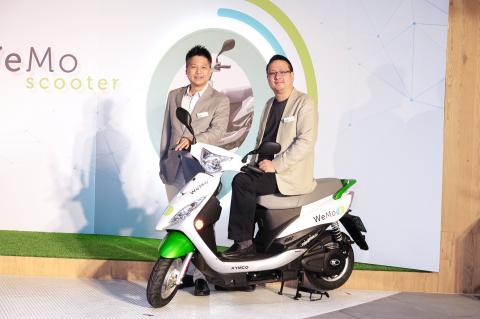Electric scooter-sharing service provider Wemo Corp (威摩科技) yesterday said that it expects to turn a profit next year as growing demand has prompted the company to double the size of its fleet and expand its business overseas.
“We hope to start making a profit in cities like Taipei next year, although some might remain unprofitable,” Wemo cofounder and chief executive officer Jeffrey Wu (吳昕霈) told a media briefing in Taipei.
The cofounder is a member of the Wu family that owns Shin Kong Group (新光集團), which operates businesses in the insurance, banking, synthetic fibers, retail and healthcare sectors.

Photo: Chen Ping-hung, Taipei Times
His optimism is built on a booming gig economy that includes vehicle-sharing and food-delivery services, not only in Taiwan, but around the globe.
Wemo has received numerous proposals to utilize its know-how to provide services or create joint ventures in Japan and Southeastern Asian nations, Wu said.
The firms include real-estate developers and vehicle leasing firms that want to tap the vehicle-sharing market, he said.
“We believe there is a good chance that [overseas expansion] will happen next year,” Wu said.
Wemo has 300,000 registered riders and that number is expected to double to about 600,000 by next year, he said.
Wemo plans to deploy between 10,000 and 15,000 electric scooters next year, up from 5,000 vehicles this year, to grab a larger share of the growing market, he added.
Wemo, which operates in Taipei, New Taipei City and Kaohsiung, also plans to expand its services to the nation’s other major cities, Wu said.
The company is in talks with private parking-lot operators to provide spaces for its scooters, which is in addition to 20 parking lots and street-side parking spaces run by the Taipei and New Taipei City governments, he said.
Wemo expects to add an additional 1,000 parking spaces in the first half of next year, which would bring the number of parking spaces to 2,000, he added.
Wemo plans to offer a new NT$99 monthly contract for 125 minutes of scooter use as it battles growing competition from Gogoro Inc (睿能創意), which is expanding its scooter-sharing service GoShare.
That is NT$0.8 per minute, a 30 percent discount compared with its current charge of NT$2.5 per minute, the company said.
The company is planning an initial public offering within the next five to seven years, it added.

BYPASSING CHINA TARIFFS: In the first five months of this year, Foxconn sent US$4.4bn of iPhones to the US from India, compared with US$3.7bn in the whole of last year Nearly all the iPhones exported by Foxconn Technology Group (富士康科技集團) from India went to the US between March and last month, customs data showed, far above last year’s average of 50 percent and a clear sign of Apple Inc’s efforts to bypass high US tariffs imposed on China. The numbers, being reported by Reuters for the first time, show that Apple has realigned its India exports to almost exclusively serve the US market, when previously the devices were more widely distributed to nations including the Netherlands and the Czech Republic. During March to last month, Foxconn, known as Hon Hai Precision Industry

Taiwan Semiconductor Manufacturing Co (TSMC, 台積電) and the University of Tokyo (UTokyo) yesterday announced the launch of the TSMC-UTokyo Lab to promote advanced semiconductor research, education and talent development. The lab is TSMC’s first laboratory collaboration with a university outside Taiwan, the company said in a statement. The lab would leverage “the extensive knowledge, experience, and creativity” of both institutions, the company said. It is located in the Asano Section of UTokyo’s Hongo, Tokyo, campus and would be managed by UTokyo faculty, guided by directors from UTokyo and TSMC, the company said. TSMC began working with UTokyo in 2019, resulting in 21 research projects,

Ashton Hall’s morning routine involves dunking his head in iced Saratoga Spring Water. For the company that sells the bottled water — Hall’s brand of choice for drinking, brushing his teeth and submerging himself — that is fantastic news. “We’re so thankful to this incredible fitness influencer called Ashton Hall,” Saratoga owner Primo Brands Corp’s CEO Robbert Rietbroek said on an earnings call after Hall’s morning routine video went viral. “He really helped put our brand on the map.” Primo Brands, which was not affiliated with Hall when he made his video, is among the increasing number of companies benefiting from influencer

Quanta Computer Inc (廣達) chairman Barry Lam (林百里) yesterday expressed a downbeat view about the prospects of humanoid robots, given high manufacturing costs and a lack of target customers. Despite rising demand and high expectations for humanoid robots, high research-and-development costs and uncertain profitability remain major concerns, Lam told reporters following the company’s annual shareholders’ meeting in Taoyuan. “Since it seems a bit unworthy to use such high-cost robots to do household chores, I believe robots designed for specific purposes would be more valuable and present a better business opportunity,” Lam said Instead of investing in humanoid robots, Quanta has opted to invest